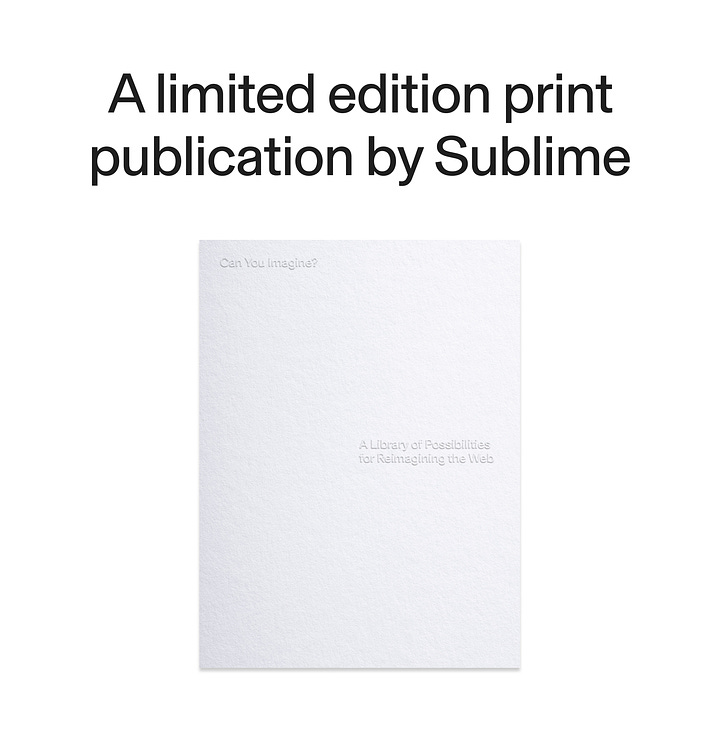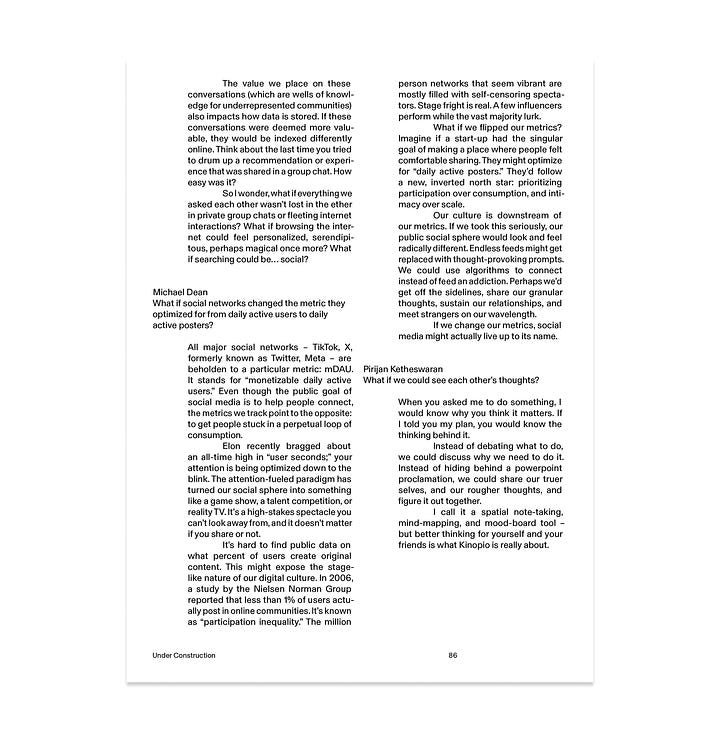Welcome to Dean’s List. I’m an architect turned writer, and last week I shared The Secret Architecture of Great Essays. That was about editing drafts to fit universal patterns, but this one jumps to the very beginning of the process: freezing your thoughts in prose.
BONSECOURS MARKET_ On the port of Old Montreal, inside an 1849 Canadian parliament building turned flea-market, I came across an odd little statue: a sitting man made of white clay. He’s holding his head in his hands, looking back at himself. In place of a head is a large open book. Unlike the mass-produced trinkets and cartons of maple syrup, this was a 1 of 1 made by an unnamed local sculptor (says the lady at the counter). $120.
I wasn’t sure if this was a surreal nightmare or an important reminder. Is this little man a prisoner of his own words? Maybe he’s written so much that his identity is made of paper, alienating himself to the point that he lives life as a third-person floating head… (belonging in the 1994 cartoon, Aaahh!! Real Monsters)… Or, is he a master of rendering his self-awareness into language? A good statue has no answers.
I didn’t buy it, maybe because my brother judged me once for spending $100 on an obsidian sphere at an Astoria street festival, or maybe because I didn’t want to deal with the logistics of smuggling this small man onto a plane. What if his head fell off? Would I have to explain myself to customs? Would they check my Substack? The image stuck with me for my whole trip in Montreal.
It haunted me because I soon realized the statue is a symbol for my most important habit: logloglog.
Today is my two year “logging” anniversary; this post is an ode. I capture my notes to self throughout the day—the events, the reflections, the mild-epiphanies—turn them into prose, and publish them unannounced to michaeldean.site/logs the next morning, outside of any feed. It’s good practice, low-pressure, word-wielding fun.
After 3,772 logs, I laughed at how unremarkable the Genesis Log was: “@December 9, 2021 8:34 PM (EDT): decided not to watch jungle cruise with danielle. it got a 62% on rotten tomatoes, and i don't trust the rock.” The bar is that low, which is precisely the point. Outside the pressure of gDocs, my very formal looking EB Garamond font, and 27 patterns to shape the perfect essay, my logs are a breeding ground for drafts to accidentally emerge.
I could preach all the practical benefits of writing every day, but the value is more psychic than anything.
Field notes from the everyday_
Logging is different from other forms of journaling. It’s not a pre-meditated brain dump along reflection prompts (morning pages). It’s not about using egg-shaped timers to jolt you into awareness every 900 seconds (interstitial journaling). This is about writing as a way of seeing. It’s perception made exterior.
Logs are field notes from the everyday.
“Field notes” are common for architects, archaeologists, ship captains, and software developers. They capture the details of a day’s events. What happened? What’s in the changelog? It requires the awareness to notice, the discipline to capture, and the foresight to shape notes so a future self can decipher them.
It’s about freezing your consciousness for future elaboration. In order for the whole system to work, you need to remember to pay attention.
It’s not about writing, but being.
Most of the day I’m in auto-pilot. My thoughts are the fluid in which I swim. I’m immersed in the river of thoughts, rings, feeds, talks, projects, and flim flam. But every log of mine is a moment that crossed some threshold of novelty. It’s like I rotate outside of my head to face myself, examining the thought I’m thinking or sight I’m seeing. I am statue man, 5x a day.
Some moments are so arresting I can’t help but think, “I should remember that!” But once I became a logger, I started experiencing extreme lucidity in mundane moments. The impetus to turn everything into language changes the way you see. I’m no longer just in a coffee shop on auto-pilot, I become the eyes of the coffee shop, finely attuned to the details, making note of either the Christmas music selection, the poor ergonomics of chairs, the highlights of today’s talk with Alice, the itchiness of my beard, or the 12 other unsuspecting strangers who have no idea they’re being chiseled into words.
Stop reading for a minute. How would you turn right now into a great paragraph? If you were to rotate out of your head and look back at your mind above your chair, what would you see and how would you name it?
“Semi-public micro-blogging as introspection” is one of the most resilient writing habits you can build. There is endless material in your inner and outer world, and all you have to do is write one great sentence. You are surrounded by things waiting to be field notes.
Even during the craziest seasons of my life–when my essay routines collapse–I log (I’ve logged 92% of days, and never less than 6,000 words in a month). It’s resilient to schemes, brands, goals, ego, and perfectionism— it’s just too easy. If you’re stuck in a publishing rut, logging is an easy way to break a funk.
A book of consciousness_
Maybe the statue resonated with me because logging is a small habit that ballooned into a big artifact. I’ve logged on average less than five times a day, but over two years I’ve generated 324,491 words—a 1,180 page book of my big stupid head—longer than the first three Harry Potter books combined, coming in at 24 hours and 2 minutes of reading.
I’m surprised I kept up with this (I’m bad with streaks), but now I can’t imagine stopping. My best guess on why this feels so right is because it lives outside of a social media feed. The complete lack of engagement is what’s liberating. Each log has no validation, no feedback loop, no record of receipt. It’s an antidote to American Idol thinking. I don’t feel the stage effect. My decision to share isn’t guided by an expectation of what an audience wants. The inherent silence forces me to be intrinsically-motivated. Do I like this thought I’m having? Is it worth pausing my life for 30 seconds to remember this in the future?
If I kept my logs to myself, my habit would probably disappear. Their semi-public nature keeps me accountable. Since anyone could manually wonder, “what’s Michael thinking?” there’s an onus to be slightly coherent and to not disappear for a month. It’s almost like a one-way mirror: you can peek into my mental room whenever you want, for 15 seconds or 2 hours, but since I can’t see you I don’t feel any self-consciousness.
What emerges is a random mosaic of thought— unpolished, unfiltered, unoptimized. It’s conceptual anarchy. Yesterday I logged about hand railings, VR, karaoke, Christmas in Bryant park, death, NPCs, foot locker advertisements, a reminder to get a Remarkable tablet, a prompt idea, flower species, a daydream, and how my landlord downstairs woke me up with her hysterical laughter at 2:45 am. It’s messy, off-brand, and true to my experience. It’s what you’d get if you plotted my thoughts into a book.
Writers need a release valve_
This all might seem like an obsessive exercise in self-documentation. I’ll admit it kind of is. I log, therefore I am. There is an existential and very human comfort in having a detailed record of my life. While a searchable memory is … useful and weird … the act of off-loading thoughts might be the most helpful part of it.
Logging is a release valve; it quiets the chatter. I feel better on days I logloglog. Much of the pain writers feel might come from a wealth of ideas without a fast enough execution cycle.
Before I started logging, epiphanies were like elephants. “Damn, I can’t wait to sit down and write the 5,000 word version of this.” Obviously it rarely happened, and then more epiphanies came, and they all lingered for weeks and months, growing stale, taunting me, eventually rotting, leaving me with nothing to show, yelling (internally), “help, help, my head is made of language!”
Logging helped me realize the power in the 50-word version of an idea. There is a calmness in the moment after expression. Knowing the idea is captured, I can move on. The process honors even the most half-baked ideas and gives them real estate on my website. Some ideas end up maturing into fully fleshed essays. Most don’t.
My log:essay ratio is 45:1, and that’s the way it’s supposed to be. I can’t save all the baby turtles, but I’d rather them linger on my site than clog my head and cloud my vision.
Three hours before my flight home from Montreal, I rushed back to Bonsecours Market to spend the remaining Canadian dollars I had on the statue of the little man with a book-head. Packing it with bubble-wrap in a shoebox, I carried it on my lap; now it’s in my Zoom background.
Here are the logs from 2023:
| January | February | March | April | May | June |
| July | August | September | October | November | December |
Let’s riff:
What should I name the statue?
Is your head made of language too and do you need a release valve?
Where is your bottleneck with field notes? (awareness, capture, sharing)
Have you ever watched Jungle Cruise and would you recommend it?
Check out my About page for context, and my Index for all published work.
Announcement:


I was honored to be asked to contribute to Can You Imagine? A Library of Possibilities for Reimagining the Web. Along with a group of online writers I admire, I have a short essay in there about social media metrics, and how we should measure “posters” over “users.” If you want a physical, 95-page zine–that includes critiques on social media, a relevant history, a reading syllabus, and visions of the future–check this out. After a year of chaos, it’s only natural that counter-cultures, reform movements, startups, and writers come together to shape an Internet we actually want to spend time on. Thanks to
and Anna Dorothea Ker for putting this together.





Loved every word and every idea and elaboration. Such a simple way of experiencing and observing. And that little statue is perfect in your bookshelf, for what it embodies. Couple if practical question, if you don’t mind:
1) where do you unload these thoughts while on the go?
2) you mentioned Remarkable. Tell me more. You think it’s good?
Thank you!
I read one of your posts and switched immediately from journaling to logging, and haven't looked back since. I log with a Shortcut that appends a new line to a Dropbox file, that's it. And I've referred to it countless times when I dedicate time to sit down and write a post, and it's been a reliable source of "ohh yes, that thing! May be worth unpacking as a post." So thank you for that!
I believe it's the essay where you talked about your dad having gifted you logs of your early childhood that made it clear to me that I gotta try this. I did it first to log my daughter's childhood moments that I don't want to forgot (like your dad for you), then I thought, hmm I should have one for myself too. So now I have 2 Dropbox files, updated 1-10 times a day with new logs. It's awesome!
Perhaps I'm lucky - I haven't stopped logging since I started and doubt I'll need or want to publish quietly to my blog. For me, that allows me to be truly unselfconscious. The fact that it helps you keep accountable just makes me feel that we can be similar yet different in fascinating ways!